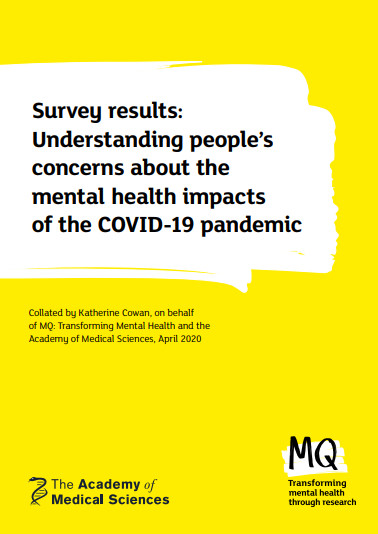The COVID-19 pandemic is not just threatening physical health, it also poses a major risk to mental health.
That’s why MQ and the Academy of Medical Sciences want research into mental health and brain science to be central to our pandemic response. Here’s five things you need to know about our new report, published in The Lancet Psychiatry today [15 April 2020]:
1. We listened first
To create these priorities, we gathered 24 world-leading experts on mental health and brain science, including people with experience of mental health problems. We invited more than 2,000 people interested in mental health to complete an online survey and commissioned an Ipsos MORI poll of more than 1,000 members of the public. We asked about your worries, your concerns, and your coping strategies, and used our expert group to pull everything together into this new report.
Paper author Professor Emily Holmes reflects: “We are all dealing with unprecedented uncertainty and major changes to the way we live our lives as a result of the coronavirus pandemic. Our surveys show these changes are already having a considerable impact on our mental health.”
2. Previous epidemics suggest big risks for mental health
Bereavement and loss will touch many in the coming months. The wider economic consequences of pandemics, such as financial stress and unemployment, are key risk factors for poor mental health. Many broader impacts of measures like self-isolation and social distancing – such as social disconnection, feeling trapped or feeling like a burden – are themselves known to be triggers for poor mental health.
We also know from previous pandemics that these issues have real consequences. The SARS outbreak in 2003 coincided with an increase in suicides for older people, and an increase in emotional distress for healthcare workers.
Professor Rory O’Connor, Professor of Health Psychology and one of the report's authors, comments: “Increased social isolation, loneliness, health anxiety, stress and an economic downturn are a perfect storm to harm people’s mental health and wellbeing. If we do nothing we risk seeing an increase in mental health conditions such as anxiety and depression, and a rise in problem behaviours such as alcohol and drug addiction, gambling, cyberbullying or social consequences such as homelessness and relationship breakdown.
“The scale of this problem is too serious to ignore, both in terms of every human life that may be affected, and in terms of the wider impact on society.”
3. We need to monitor the size of the problem
Right now, we need to better monitor and report rates of anxiety, depression, self-harm, suicide and other mental health issues across the population. We need to pull together data from both existing databases and new methods of data gathering, to understand the true scale of the problem. Only then will we be able to understand whether or not any of our efforts to make things better are working.
Paper author Professor Matthew Hotopf CBE FMedSci said: “We are calling for real time monitoring of mental health of the population to develop effective treatments. This needs to be on a bigger scale than we have ever seen previously, and must be coordinated, targeted and comprehensive to give us an evidence based picture of what is really going on in societies around the world.”
4. It’s not all bad
Study author Kate King MBE has personal experience of severe depression and advised the UK government on The Mental Health Act Review 2018. She reflects that, “The digital age, for all its problems, has bestowed a real gift: social media, the internet, video and phone meetings mean that social communication and research can continue in a way that would have been impossible even twenty years ago.”
We will all learn new ways of coping from this pandemic, and the future isn’t written in stone – we might find new ways to reduce key risk factors and improve lives. Long-term, we can look for new ways to protect mental wellbeing, like how to encourage positive activities such as exercise and volunteering. We can learn how to best promote people’s care and concern for others. We can write new guidance for how to produce and consume modern media without feeling overwhelmed. And we can plan for the future: as we can never totally eradicate the risk of future pandemics, we can take key lessons from our experiences to help people in the future.
5. You can always reach out
We want to stress that support continues to be available even through this pandemic. If you or someone you know is struggling with mental health, you shouldn’t hesitate to reach out for help. Many organisations and services are offering advice; MQ provides a list of key providers and sources of advice on their website – and in a medical emergency, always call 999. As a first point of contact, Samaritans provides confidential non-judgemental emotional support, 24 hours a day, and their number is 116 123.
Find out more about our work through this short summary. More detailed information about the report is available here.

